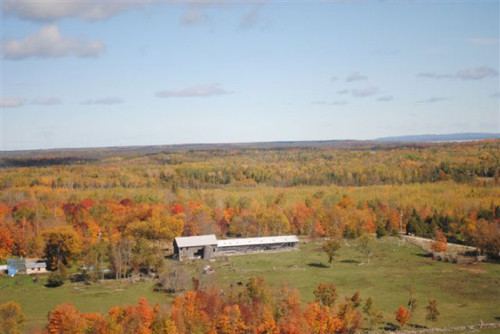EVANSVILLE—Upset with the province reassessing non-tillable land into residential tax assessment on farm lands, Burpee-Mills Township council supports a resolution from another Ontario municipality, calling for a review of this action.
“It is very frustrating when you have to fight MPAC (Municipal Property Assessment Corporation) over an issue, and eight years down the line we as municipalities and farmers have to fight them and the province again on the same issue. This issue could definitely hurt farmers around here,” said Ken Noland, reeve of Burpee-Mills, last week.
“MPAC is rooking the farmland guys again,” stated Reeve Noland, explaining that MPAC recently changed the assessment classification on properties with portions of land tenanted for farming. The change means farm properties are now classified in the residential property class, and this has led to an increase in taxes on a property by as much as 572 percent (on a farm property in southern Ontario).
Reeve Noland pointed out that Burpee-Mills township council is in support of a resolution having been passed by council for the municipality of Morris-Turnberry on the issue. In a letter dated October 17, 2017 its council states, “MPAC conducts ongoing reviews to ensure properties are accurately assessed and corrections are made where necessary. A review of a property could be triggered from ongoing data verification, updated tenant information, sales investigations, building permits and severances which may result in changes to the valuation or classification of a property. This could include wooded acreage on a farm property.” It is explained, “MPAC recently changed the assessment classifications on properties with portions of land tenanted for farming.”
“MPAC is responsible for assessing and classifying all properties in Ontario in accordance with the assessment act and regulations established by the government of Ontario,” Morris-Turnberry continued. “All properties in Ontario are continuously reviewed as part of the MPAC valuation process to ensure accurate information is used in determine our assessed values and tax classifications.”
“MPAC has stated under the Assessment Act, all properties are classified according to their use, and Ontario Regulation 282/98 sets out how various property uses are classified. By default, farm properties are classified in the residential property class in accordance with section 3(1)2 of Ontario Regulation 282/98 of the Assessment Act. Farm properties that meet the eligibility requirements will have farmland and associated outbuildings placed in the farm property class and are taxed at up to 25 percent of the municipal residential tax rate. An application for inclusion in the Farm Property Class Tax Rate Program must be approved by the Ontario Ministry of Agriculture, Food and Rural Affairs (OMAFRA).”
Under the Assessment Act, all proponents are classified according to their use. If a portion (or portions) of a farm property is used for non-farm purposes, the portion is valued and classified according to its use. This is to ensure that the appropriate value and tax class is applied to the various uses of the property.”
MPAC has now “assessed non-tillable acreage that is rented to tenants as residential,” the letter continues. “MPAC has explained that this is a correction under the Assessment Act/Ontario Regulation 282/98 with properties being assessed according to their use. They explained that it was a review of the Farm Forestry Exemption class that prompted this action.”
“Most of these non-tillage acres cannot be built upon or generate any revenues. However, they do provide benefit to the wider community as woodlots, wetlands, streams. Therefore taxing at the higher residential ratio appears unfair,” says the Morris-Turnberry letter. And because of this change, “many properties have resulted in a substantial increase in property taxes due to this assessment class shift, an example being, with the tax billing increase of 572 percent. Tax increases to this magnitude are unacceptable. This process will force retired farmers to share crop to avoid the tax increases or it will cause land rent to increase to cover the increased taxes. That will create burden on the property owner and the tenant farmers.”
It was pointed out that MPAC did not advise the municipalities of these corrections or the impact that it may have on taxation write-offs going forward.
Morris-Turnberry council, in its motion, is requesting that MPAC conduct a review on the effects of the tax class shift from farm land to residential. “And that MPAC act immediately on applications for reconsideration for the 2018 tax year and where possible, for the 2017 year; and that MPAC advise the municipalities prior to any future tax class shifts or mass property assessment corrections; and that the Province of Ontario review Regulation 282/98 under the Assessment Act, in respect to the property tax classification of non-tillage acres.”
“Basically what is happening is nothing new, essentially they are using a court case ruling of the 1970s and interpretable for non tillable land,” said Ben Lefort of the Ontario Federation of Agriculture (OFA). But, he said, these non-tillable lands should not be reclassified as residential.
Mr. Lefort noted that a letter sent by the OFA to the Minister of Finance in 2009 is still the standing policy of the OFA board. In the letter the OFA noted, “Ontario farmers recognize and accept that not all land on their farms should be put into agricultural production. We also recognize that some non-farmed land on farms provide significant environmental benefits such as adverting soil erosion, protecting watersheds and providing wildlife habitat.
“Unfortunately, the MPAC current assessment practice could force many farm owners to consider farming all areas on their farm properties, including marginal or sensitive land,” he continued. “The alternative would be to face a significant increase in property taxes. Inclusion of non-farmed areas in the residential assessment instead of the farm assessment will result in a significant increase in the property tax burden.”
“The OFA holds the view that all land on an active farm should be treated as agricultural land for property tax purposes,” Mr. Lefort said. “We understand that areas used for purposes other than for farm purposes are to be partitioned and assessed separately. However, we object to MPAC partitioning and taxing areas that are not explicitly used for farming activities. If no other purpose exists, then these areas should remain part of the farm lands. To do otherwise would force inappropriate farming practice through tax policy.”





